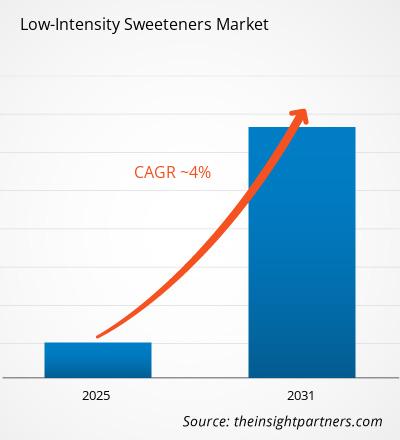Analyst Perspective
The global low-intensity sweeteners market is expected to register a CAGR of ~4%. The global market for low-intensity sweeteners is on the rise, driven by increased demand for food and beverages, ongoing research for advancing sweetening products, and a growing health-conscious consumer base. Changing lifestyles and health awareness have led to a surge in the use of these sweeteners, allowing people to enjoy various foods without worrying about calorie intake. Consumer resistance, stringent regulations, and price competitiveness are significant challenges that hamper the growth of the low-intensity sweeteners market. Growing health consciousness, product innovation, and diversification beyond food & beverages are significant opportunities for the growth of the low-intensity sweeteners market. A shift towards healthier choices and ongoing advancements in sugar substitute options propels the market.
Market Overview
Low-intensity sweeteners, often sugar substitutes, are gaining traction due to a rising consumer preference for low-calorie foods. The food and beverage industry is witnessing a notable increase in the desire for natural ingredients. These low-intensity sweeteners, sourced from nature, are becoming more popular because of their perceived health advantages and the attractiveness of clean labels. The food and beverage industry is growing because of changing consumer preferences and a rising population, positively impacting the low-intensity sweetener market. Manufacturers focus on developing efficient and health-positive products, investing heavily in research and development to create safer sweeteners like sorbitol, maltitol, xylitol, and allulose.
Market Drivers
- Health concerns
People are becoming more aware of the health risks associated with sugar consumption, such as obesity, diabetes, and heart disease, which leads to a growing demand for low-calorie sweeteners as a way to reduce sugar intake. Diets such as Atkins and ketogenic diets, which restrict sugar intake, are becoming increasingly popular, which drives the demand for low-intensity sweeteners market.
- Taste preference
Consumers are always looking for food options with low health risks, and low-intensity sweeteners offer a way to do this, as they are sweeter than sugar but contain very few calories. Manufacturers have improved the taste of these sweeteners, making them more preferable to consumers.
Market Segmentation
The global low-intensity sweetener market is segmented based on type, category, and application. The global low-intensity sweetener market is segmented based on type into xylitol, tagatose, allulose, trehalose, isomaltulose, and others. The low-intensity sweetener market is segmented based on form into dry and liquid. The low-intensity sweetener market is segmented based on application into food & beverages, bakery and confectioneries, dairy and frozen desserts, and others.
Regional Analysis
The report provides a detailed industry overview, which includes qualitative and quantitative information. It gives information on an overview and forecast of the global low-intensity sweetener market based on several segments. It also provides market size and forecast estimates from 2021 to 2031 concerning five major regions: Europe, North America, Asia-Pacific (APAC), Middle East & Africa (MEA) and South & Central America. The low-intensity sweetener Market by region is also sub-segmented by respective countries and segments. The low-intensity sweetener Market report covers an analysis and forecast of 18 countries globally and the prevailing trends and opportunities in the region.
The report analyses factors affecting the Low-intensity sweetener market from both the demand and supply side. Furthermore, it evaluates market dynamics during the forecast period, i.e., drivers, challenges, opportunities, and future trends. The report also provides an extensive Porter's Five Forces analysis highlighting factors affecting these regions' low-intensity sweetener market.
Key Players
The reports cover vital organic and inorganic growth strategy developments in the low-intensity sweetener market. Various companies concentrate on organic growth strategies such as product launches, approvals, patents, and others. Inorganic growth strategies activities observed in the market were acquisitions, partnerships & collaborations. These activities have paved the way for the development of the business and customer base of market players. The Low-intensity sweetener market players are expected to have lucrative growth opportunities with the rising demand for low-calorie sweeteners in various food and beverage applications in the global market.
The report includes key companies' profiles, SWOT analysis, and low-intensity sweetener market strategies. The report also focuses on leading market players with information including components and services offered, company profiles, financial information for the last three years, and critical development in the past five years.
Below is a list of low-intensity sweetener market companies.
- Tate & Lyle
- ADM
- Hamburg Fructose GmbH International
- Anderson Global Group, LLC
- Roquette Frères
- SAVANNA Ingredients GmbH
- Cargill, Incorporated
- DuPont Nutrition and Biosciences
- Van Wankum Ingredients
- IHC-I.H. Chempharm GmbH
Low-Intensity Sweeteners Report Scope
| Report Attribute | Details |
|---|---|
| Market size in 2024 | US$ XX million |
| Market Size by 2031 | US$ XX Million |
| Global CAGR (2025 - 2031) | ~4% |
| Historical Data | 2021-2023 |
| Forecast period | 2025-2031 |
| Segments Covered |
By On Type
|
| Regions and Countries Covered | North America
|
| Market leaders and key company profiles |
- Historical Analysis (2 Years), Base Year, Forecast (7 Years) with CAGR
- PEST and SWOT Analysis
- Market Size Value / Volume - Global, Regional, Country
- Industry and Competitive Landscape
- Excel Dataset



Report Coverage
Revenue forecast, Company Analysis, Industry landscape, Growth factors, and Trends

Segment Covered
This text is related
to segments covered.

Regional Scope
North America, Europe, Asia Pacific, Middle East & Africa, South & Central America

Country Scope
This text is related
to country scope.
Trends and growth analysis reports related to Food and Beverages : READ MORE..
The List of Companies
1. Cargill, Incorporated.
2. Ingredion
3. Roquette Frères
4. Matsutani Chemical Industry Co., Ltd.
5. Südzucker
6. PureCircle
7. MITSUI and CO., LTD.
8. Tate and Lyle
9. SweetLeaf® Stevia Sweetener
10. HYET Sweet

 Get Free Sample For
Get Free Sample For